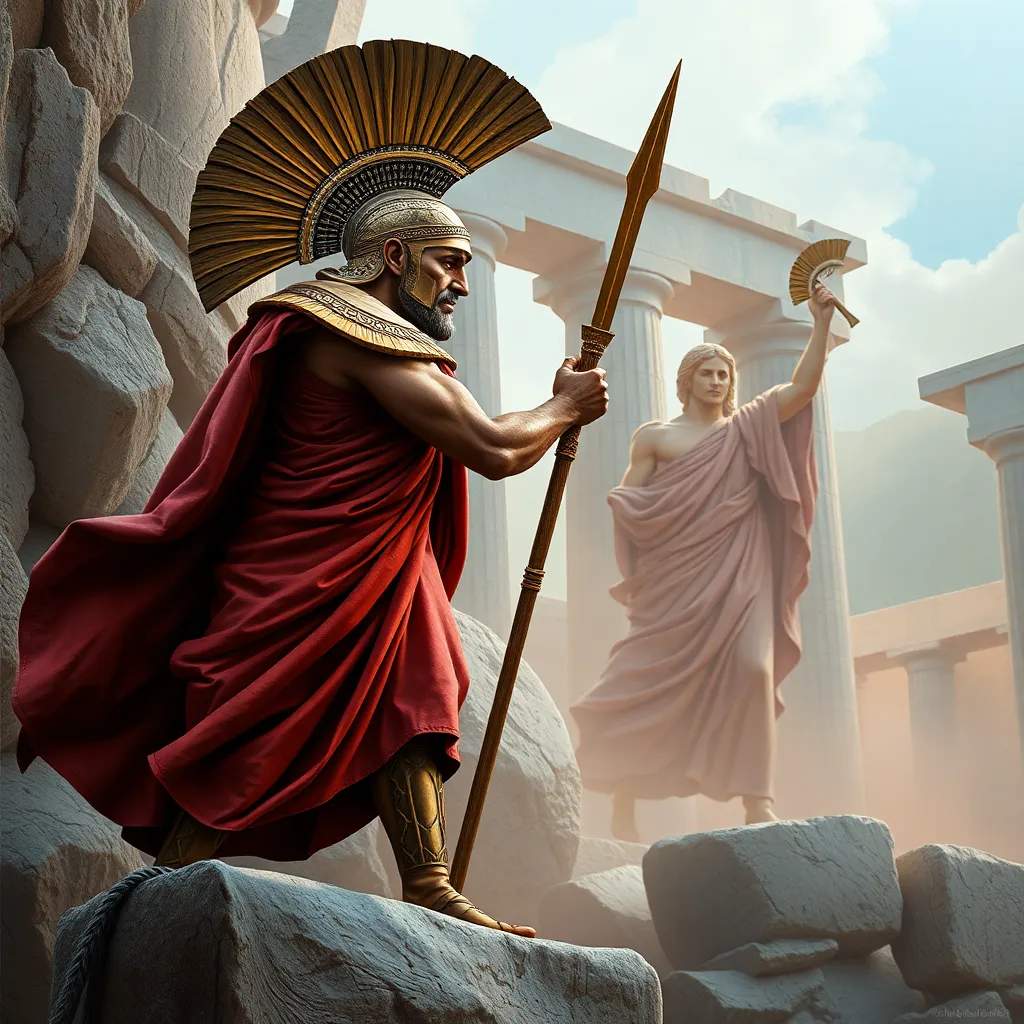Ares and the Ethics of War: Ancient Greek Perspectives
I. Introduction
Ares, the Greek god of war, embodies the tumultuous and chaotic nature of battle. Unlike other deities who may represent strategy or wisdom, Ares is often associated with the sheer brutality and violence of conflict. His character raises significant questions about the ethics of war, particularly in the context of ancient Greek society, where warfare was a critical aspect of life.
In ancient Greece, war was not just a means of conflict resolution but a defining element of social identity and political power. As such, examining Ares offers a unique lens through which we can explore the moral implications of warfare, asking whether the chaos he embodies serves any ethical purpose.
II. Ares: The God of War
Ares is often depicted as a powerful and aggressive figure, equipped with a spear or sword and accompanied by symbols of violence such as vultures and dogs. His attributes include:
- Strength and brutality
- Fierceness and aggression
- A lack of strategic wisdom
In Greek mythology and literature, Ares plays a role that often highlights his negative qualities. He is frequently contrasted with Athena, the goddess of wisdom and strategic warfare, who represents the more honorable aspects of military engagement.
While Ares embodies chaos, Athena symbolizes the virtue of strategy, planning, and justice in warfare. This duality raises questions about the nature of war itself, and whether it can ever be justified.
III. The Concept of War in Ancient Greece
The historical context of warfare in ancient Greek city-states reveals a complex landscape of conflict. Warfare was not only common but celebrated, with various types of battles and strategies employed:
- Hoplite battles: These were characterized by heavily armed infantry soldiers fighting in close formation.
- Naval conflicts: City-states like Athens relied heavily on their naval power for dominance.
- Raids: Smaller skirmishes often occurred, targeting enemy territories or resources.
The societal impact of war permeated all aspects of Greek culture, influencing art, literature, and philosophy. War heroes were celebrated, and the honor of the city-state often rested on military success.
IV. Ethical Considerations of War in Ancient Texts
Key literary works such as Homer’s “Iliad” and “Odyssey” provide insights into the ethical dimensions of war. In the “Iliad,” the consequences of pride and rage are depicted through the character of Achilles, whose personal conflicts lead to devastating outcomes for both sides.
Philosophers like Plato and Aristotle also grappled with the ethics of war. Plato, in his dialogues, questioned the morality of warfare and the justifications for conflict, while Aristotle discussed the concept of virtue and the role of courage in battle.
Warriors and leaders often faced moral dilemmas, such as:
- The justification of war: Is it ever right to engage in conflict?
- The treatment of prisoners: What ethical responsibilities do victors have?
- The impact on civilians: How do we weigh the costs of war on innocent lives?
V. Ares as a Symbol of War Ethics
Ares serves as a powerful symbol of the ethical questions surrounding war. His duality reflects the conflicting perceptions of war itself—chaos versus honor. In art and literature, Ares is often portrayed as:
- A fearsome warrior, embodying the violence of battle.
- A figure of chaos, representing the destruction and loss that accompany war.
The public perception of Ares among the ancient Greeks was complex. While he was admired for his strength, he was also feared for his unpredictability and the havoc he could wreak on society.
VI. The Role of Fate and the Divine in Warfare
The Moirai, or Fates, played a significant role in Greek mythology, influencing the destinies of both mortals and gods. The interplay of fate and divine intervention raises important ethical questions about war:
- Influence of Moirai: The Fates determine the outcomes of battles and the lives of warriors, suggesting that human agency may be limited.
- Divine intervention: Gods often intervened in human affairs, complicating the ethical landscape of warfare.
- Ethical implications of fate: If outcomes are predetermined, what responsibility do individuals bear for their actions in war?
VII. Contemporary Reflections on Ares and War Ethics
The ancient Greek perspectives on war ethics remain relevant today. Modern warfare continues to grapple with similar issues of morality and justification. The lessons from Ares and Greek philosophy can inform contemporary ethical discussions, such as:
- The justification of military intervention in global conflicts.
- The ethical treatment of combatants and non-combatants.
- The consequences of war on society and culture.
As we evolve in our understanding of warfare, the ethical frameworks established in ancient Greece serve as a foundation for ongoing debates about the morality of conflict.
VIII. Conclusion
This exploration of Ares and the ethics of war reveals the complexities surrounding the concept of conflict in ancient Greek society. From the duality of Ares as a symbol of chaos and honor to the philosophical inquiries of Plato and Aristotle, the ancient Greeks grappled with the moral implications of warfare.
As we reflect on these historical perspectives, it becomes clear that the legacy of Ares and ancient Greek views on war ethics continue to shape our understanding of conflict today. A deeper examination of these themes can enrich contemporary discussions on the morality of war, urging us to consider the ethical ramifications of our choices in the face of violence.




